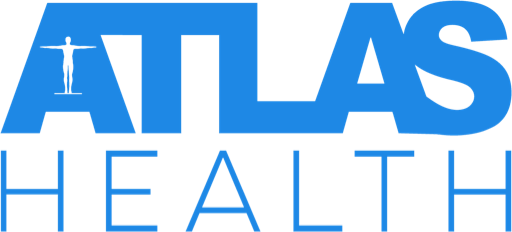Atlas Health’s state-of-the-art products, services, and solutions are designed to help a broad range of stakeholders reduce the incidence, prevalence, and cost of musculoskeletal disorders (MSDs).
Our unparalleled offerings include:
- 3D-Animated Exercise Delivery Systems (EDSs) that serve up not only the “usual suspects” from physical therapy, occupational therapy, and the rehabilitative sciences; but also brilliantly remastered exercises that serve not only conventional physical therapists but also those practicing mechanical diagnosis and therapy
- 3D-Animated Surgical-Recovery Applications (e.g., for Knee-Replacement Surgery) that use anatomically correct 3D animations, implicit motivational interviewing, and evidence-based health coaching to help improve patient engagement, education, empowerment, activation, adherence, and outcomes
- 3D-Animated Self-Care Apps (e.g., for Low Back Pain) that package evidence-based exercises into patient-facing solutions designed to promote self-efficacy, reduce fear, alleviate pain, improve activities of daily living (ADLs), and enhance quality of life (QOL)
Our Company serves:
- patients and patient advocacy groups seeking (1) better athletic, preventive, diagnostic, therapeutic, and palliative care; (2) improved activities of daily living (ADLs), and (3) the highest possible quality of life (QOL);
- healthcare professionals (HCPs)—like physical therapists (PTs), occupational therapists (OTs), rehabilitation specialists, orthopedists, orthopedic surgeons, neurologists, neurosurgeons, and rheumatologists—seeking improved results on clinical outcome assessment (COA) instruments, patient-reported outcomes (PRO) surveys, and net promotor scores (NPSs);
- healthcare administrators leading personalized medicine, population health management (PHM), and human performance optimization (HPO) programs and pursuing the Triple/Quadruple/Quintuple Aim of (1) reduced per capita costs, (2) improved population health, (3) enhanced patient experiences, (4) improved provider satisfaction, and (5) broadened health equity;
- healthcare enterprises including (1) physical therapy (PT), occupational therapy (OT), and rehabilitation clinics; (2) primary care practices (PCPs) and patient-centered medical homes (PCMHs); (3) multi-specialty medical practices including orthopedics, orthopedic surgery, neurology and neurosurgery, and rheumatology; (4) ambulatory surgery centers (ASCs); (5) hospitals and health systems; (6) integrated delivery networks (IDNs); and (7) accountable care organizations (ACOs);
- healthcare purchasers like self-insured employers (SIEs) and self-funded unions (SFUs)—seeking reduced costs in health and wellness, group health, workers’ compensation, short-term disability, and long-term disability programs;
- third-party payers (TPPs) and third-party administrators (TPAs) seeking to improve their brand equity or reduce their medical cost ratios (MCRs); and
- practice-based researchers (PBRs), health policymakers, and public health administrators seeking to improve the well-being, productive capacity, and socioeconomic status of individuals, organizations, and communities.
Altas Health’s clinical, animation, and programming experts help these MSK-focused stakeholders design, develop, and deploy market-leading:
- programs, projects, and products;
- athletic, preventive, diagnostic, therapeutic, and palliative care protocols;
- personalized medicine programs, population health management (PHM) programs, and human performance optimization (HPO) programs;
- digital-health ecosystems (DHEs), prescription digital therapeutics (PDTs), and patient-registry-enabled living laboratories (RWE Labs);
- clinical, financial, and administrative dashboards, scorecards, and management reports; and
- performance, outcomes, and impacts.
Our specialists help talent acquisition, development, and retention teams create or improve MSK-related curricula, courses, and content—leveraging Atlas Health’s instructional 3D animations to counter a broad range of kinesiological dysfunctions associated with bones, muscles, cartilage, tendons, ligaments, connective tissue, and related physiological structures.
Atlas Health also provides analytical, strategic, and hands-on support services to improve patient engagement, education, empowerment, activation, adherence, and outcomes—leveraging an ever-growing repository of 3D-animated MSK exercises to promote the delivery of medically necessary, prescription-grade information therapy (InfoRx) on a just-in-time (JIT) basis.
Atlas Health’s customized and turnkey systems, programs, and applications include intuitive provider-facing and patient-facing user interfaces (UIs) that:
- enable speedy exercise prescribing via advanced search capabilities and smart filters;
- facilitate frank, friendly, and effective clinician-patient communications; and
- improve self-care, healthcare, and community care.
Our Company’s digitally remastered exercise-prescribing system ensures MSK clinicians need only:
- search for indicated exercises to optimize them for patient needs,
- modify the “dose” as needed to improve patient outcomes, and
- send prescribed exercise protocols directly to patients via email and text.
Atlas Health’s clinical, animation, and programming experts can help healthcare professionals and enterprises create tailor-made exercise-prescription templates and store them in structured folders with structured file IDs.
- With help from our bespoke-application specialists, clients can modify exercise-specific instructions, reorder exercise queues, change narrator languages and voiceovers, and produce exercise printouts and PDFs.
Atlas Health organizes all 3D-animated, precision-scripted, and adherence-promoting videos intuitively—e.g., by clinical episode, evidence-based therapeutic objectives, and progressive clinical encounters—to reduce pain, restore physical function, improve activities of daily living (ADLs), promote health-related quality of life (QOL), and enhance patient satisfaction.
In kickoff meetings, Atlas Health’s clinical, administrative, and financial experts review user experience (UX) and user interface (UI) design elements—and explain how these:
- facilitate health coaching in brick-and-mortar, remote, and hybrid settings;
- serve up digestible daily guidance on clinically appropriate self-care and deliver compelling reminders to patients at especially well-timed intervals; and
- improve real-world results (RWRs) under volume-based fee-for-service (FFS) markets, value-based healthcare (VBHC) markets, and volume-to-value (V2V) transition markets.
In onboarding programs, our Company experts explain how patients can receive texts, emails, and app-based alerts with click-through prompts and progressive guidance on self-care and kinesiology.
- We demonstrate how—by simply clicking a button—patients can revisit print, digital, and audiovisual instructions as frequently as they prefer.
- We show how—with intuitive scrolling—they can play back the panoramic views, closeups, or other camera angles they find most helpful—exploring exercises, transfers, assistive device usage, and more.
- We even recommend outside readings that can expand stakeholders’ understanding of psychosocial, physiological, anatomical, biomechanical, pathological, and neuropsychological principles and mechanisms of movement.
Ultimately, Atlas Health proves that—with fewer miscommunication setbacks around their prescribed exercises—patients can be far more compliant with exercise instructions—and they can recover more quickly.
To learn more about the clinical, financial, and administrative outcomes that our Company experts could help you realize, contact Atlas Health today.
